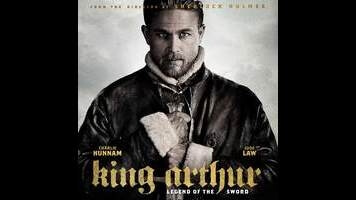King Arthur: Legend Of The Sword is a dull blockbuster that sends up dull blockbusters

The legendarium of King Arthur and the Knights Of The Round Table is rich in symbolism, mysticism, and visions, and so any attempt to narrowly rewrite it for modern tastes ends up coming across as a failure of imagination. Antoine Fuqua’s King Arthur was the last costly wannabe blockbuster to ask what Arthurian legend would be like if it were boring, and before that, there was Jerry Zucker’s First Knight. Maybe it’s a once-in-a-decade phenomenon, with the gritty (but not too gritty) 2010s iteration being King Arthur: Legend Of The Sword, directed and co-written by Guy Ritchie, the former Brit-crime hotshot who’s since gone on to a career of giving the Guy Ritchie treatment to uninspiring journeyman material (this film, The Man From U.N.C.L.E., Sherlock Holmes, Sherlock Holmes: A Game Of Shadows) with varying degrees of success. The best and worst thing about his King Arthur is that it’s a complete mess—by turns a generic fantasy film in the house style of the Warner Bros. superhero movies (dingy lighting, noticeable re-cuts), and a nose-thumbing, mock-cockney-fied send-up of the same. The franchise-hungry tentpole-itis of the present studio model has produced oh-so-many dumb rehashes of classic myths and fairy tales, but this is the first that is always funny on purpose.
The pre-credits prologue sets up a movie that seems uncharacteristically humorless by Ritchie’s standards, as Arthur’s father, Uther Pendragon (Eric Bana), vanquishes the wizard Mordred while defending Camelot from an army of giant elephants. (As if one needed proof that no Hollywood screenplay can compare to the real thing, it should be pointed out that, besides being a knight, the traditional Mordred is also Arthur’s illegitimate son from an incestuous tryst between the king and his half sister.) But Uther is betrayed by his power-hungry brother, Vortigern (Jude Law), at which point the young Arthur is cast to float down the River Thames à la the baby Moses, and King Arthur unexpectedly and blessedly turns into an attention-deficient Guy Ritchie movie, starting with a rapid-fire montage. It races through what, in a different film, might be 20 minutes of story in a couple of wordless minutes, as Arthur (Charlie Hunnam) grows into a Ritchie-esque small-time crook on the tough streets of “Londinium.” He operates out of the back of a brothel, socks Vikings, and pals around with buddies with names like Wet Stick (Kingsley Ben-Adir), Back Lack (Neil Maskell), and Chinese George (Tom Wu). Ritchie and costume designer Annie Symons even give him a primitive shearling coat.
Yet this is still very much a paint-by-numbers fantasy adventure. Arthur pulls the fabled sword from the stone; gets rescued by Sir Bedivere The Wise (Djimon Hounsou) and his band of woodland dissidents; and is assisted by a nameless sorceress (Astrid Bergès-Frisbey) on a hallucinatory vision quest and climactic showdown with Vortigern. (The latter is almost incomprehensible—the kind of thing that leads a critic to scrawl “giant snake?” in their notes.) It resembles nothing so much as a dysfunctional marriage between two films that can’t stand the sight of each other. In King Arthur’s more inspired moments, Ritchie plays hard-to-get with the plot, disrupting all that “reclaim Excalibur and Camelot, defeat Vortigern” Legend Of The Sword nonsense with motor-mouthed montages and flashbacks straight out of a smart-alecky heist movie, hearkening back to the name-making one-two of Lock, Stock And Two Smoking Barrels and Snatch. This is the light, entertaining King Arthur—the one where characters wonder aloud how the Round Table got into Camelot. (“Did you roll it in on its side?”) It has a somewhat unconventional score (hurdy-gurdy, sampled breathing), some interesting camera angles, and decent one-liners.
But there is the other, lugubrious King Arthur, a strained fantasy flick with pseudo-medieval production design that suggests a very special episode of Hercules: The Legendary Journeys about the evils of fascism, filmed on an overcast day. This King Arthur has it moments—mostly grotesque touches like the trio of cephalodian witch-sirens who live in a Wagnerian cavern under Camelot, their origin and purpose in the plot never really accounted for. Law, who always seems to look best dressed head to toe in black, even makes for an effective (though underused) villain. But though King Arthur gives him a chance to over-indulge his well-established taste for randomly speed-ramped action, Ritchie can barely muster any behind-the-camera enthusiasm for the high-fantasy elements; the special-effects-heavy sequences are as generic as they come, and incoherent to boot. His Camelot is a cheerless eyesore, a stone salt shaker on a mountain side. No wonder his wise-ass Arthur is reluctant to take up the mantle of kinghood. Ruling from such a dismal parapet looks like a chore.